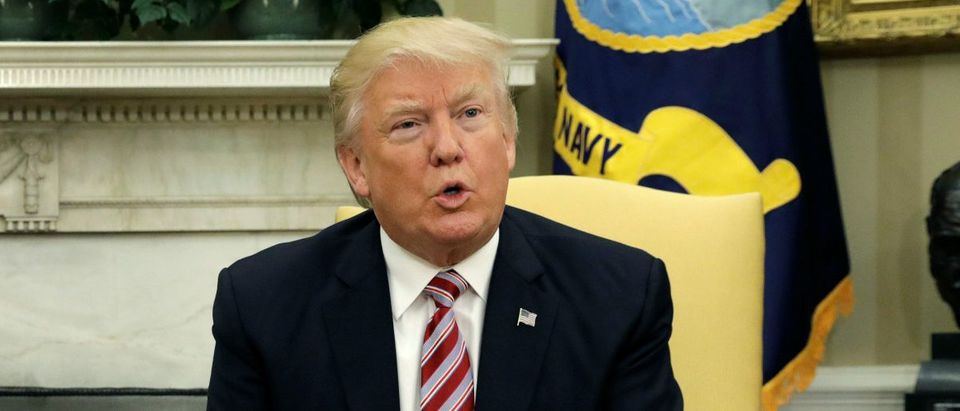President Donald Trump said in early May he is willing to break up big banks, but Wall Street investors are not taking him seriously.
Investors are instead focusing on the president’s promises to massively deregulate the financial sector, starting with an overhaul of the 2010 Dodd-Frank Act.
In October 2016, Trump promised to consider bringing a “21st century version” of the 1933 Glass-Steagal Act which mandated that commercial and investment banking be completely separate entities. Treasury Secretary Steve Mnuchin and National Economic Council Director Gary Cohn both support Trump’s endorsement of a 21st century Glass-Steagal.
The president doubled down on his promise in a May 1 interview with Bloomberg, saying that he is reviewing the option of bringing back the Depression-era law.
“I’m looking at that right now,” Trump said. “There’s some people that want to go back to the old system, right? So we’re going to look at that.” (RELATED: Trump: I’m ‘Looking’ Into Breaking Up Big Banks)
Wall Street believes that if Trump successfully reinstates Glass-Steagal, the new mandates would simply deregulate smaller banks without breaking up large banks, Bloomberg reports. But top level bankers at some of the nation’s largest banks are reportedly supportive of the president’s agenda, as they believe it is a better alternative for small, community banks than the current environment under Dodd-Frank.
Originally, Dodd-Frank intended to increase transparency by implementing a consistent set of regulations aimed at closing loopholes and making firms accountable for their own mistakes. The bill attempted to shift the burden of major financial mistakes from taxpayers to market participants, ensuring those who partake in risky investment practices would bear the financial burden of their mistakes. Dodd-Frank promised to end “too big to fail” and “promote financial stability” in the wake of the Great Recession.
Despite the Act’s intentions, large banking institutions have grown dramatically since the passage of Dodd-Frank, and small community banks have incurred serious losses trying to keep up. Crippling regulations saddled smaller banks, forcing American consumers to shoulder fewer investment vehicles and greater costs.
For example, prior to Dodd-Frank, some 75 percent of banks offered free checking. That figure fell to 39 percent just two years after Dodd-Frank came into effect, showing that consumers are paying more and getting less. Low-income consumers suffering the most, according to research by the International Center for Law and Economics.
Wall Street firms are focused on Trump’s promise to overhaul Dodd-Frank. Specifically, major banks want him to do away with the Volcker rule, which limits how Wall Street firms trade and invest their own money.
Mnuchin reportedly told regulators in a closed door meeting on May 8 to examine what banks are allowed to do under the Volcker rule.
Members of the House banking panel revealed a 600-page proposal in mid-April to roll back the Dodd-Frank. The president has said he expects to cut out significant portions of the act in 2017.
Send tips to robert@dailycallernewsfoundation.org
All content created by the Daily Caller News Foundation, an independent and nonpartisan newswire service, is available without charge to any legitimate news publisher that can provide a large audience. All republished articles must include our logo, our reporter’s byline and their DCNF affiliation. For any questions about our guidelines or partnering with us, please contact licensing@dailycallernewsfoundation.org.


